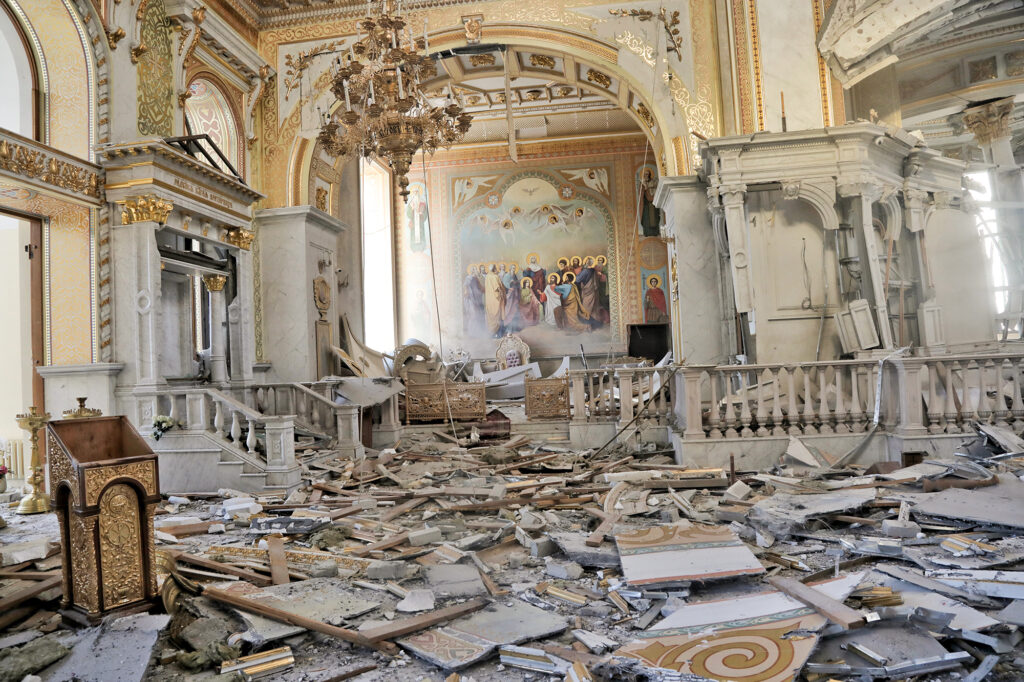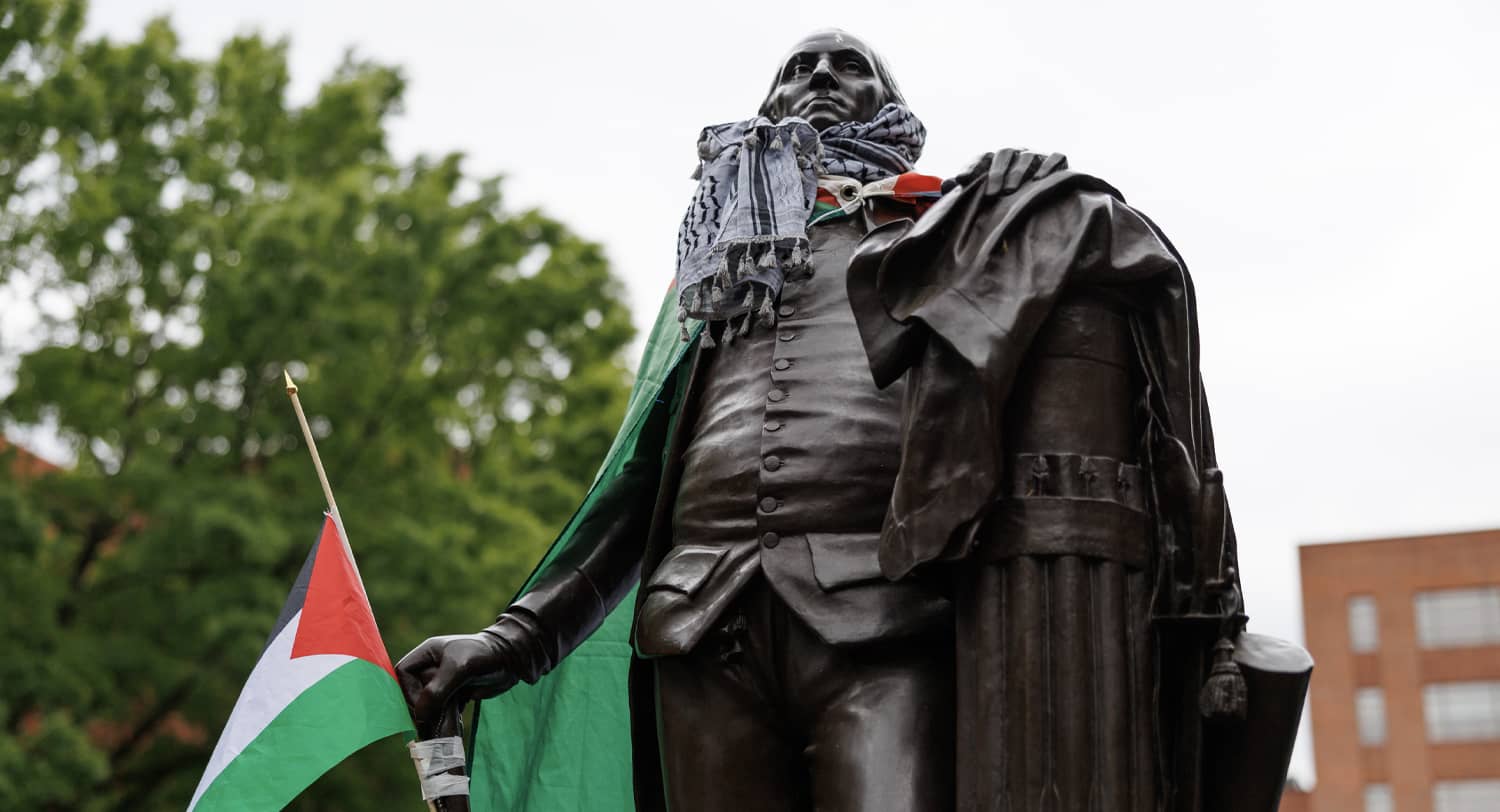Many observers of the pro-Gaza/Hamas demonstrations at college campuses throughout the U.S. have been taken aback by the rhetoric and behavior of the protestors and their advocates. Masked faces and widespread refusals to self-identify display the protestors’ reluctance to face real consequences for their actions. What is most troubling, however, is the contention that Israeli Jewish citizens are actually European colonial settlers. This represents a purposeful omission of incontrovertible historical facts concocted to align with today’s zeitgeist, as well as Hamas’ propagandistic agenda.
Yet there is something deeper in this allegation, something more than merely coloring the Holy Land as a territory foreign to its original Jewish inhabitants. It is a selective indignation—one that turns a blind eye to a brutal, atrocity-plagued, eliminationist war being fought between two nations – aggressor Russia and defender Ukraine. Were these protesters to stop for a moment and consider the history of Russo-Ukrainian relations, some just might come to see that Ukrainians have been victims of Russian colonial ambitions for centuries.
Colonialism is the practice by which a powerful country (i.e. Russia) directly controls less powerful peoples (i.e. Ukrainians) and uses their resources to increase its own power and wealth. Accepting this definition, examples of state-sanctioned oppression of the Ukrainian nation abound. But what first needs to be understood is that the Ukrainians constitute a nation fundamentally distinct from that of their northern aggressors.
Consider some basic aspects of nationhood. The Ukrainian language is as different from Russian as, say, Portuguese is from Spanish. As for the heritage Russian speakers with Ukrainian citizenship, their language at home does not suggest that they identify other than as Ukrainian nationals. Religiously, many who live in Ukraine’s present-day west are members of the Ukrainian Catholic Church, which adheres to Orthodox ritual while accepting the Vatican’s authority. Elsewhere, Orthodox Ukrainians had been battling for their own independence from the Moscow Patriarchate for over a century, finally being granted autocephaly by Bartholomew I of Constantinople in 2018. Ukrainian culture, whether custom, clothing, cuisine, or song, is no mimicry of Russia’s: far from it. Moreover, various segments of the Ukrainian nation have had periods of autonomous governance from the Middle Ages through to the present. Those times in their history contributed significantly to a national identity that, together with the above, differentiates them from other Slavic nations.
Russia’s attempts to subjugate Ukrainians date back to 1667, when a truce following 13 years of war between Russia and the Polish-Lithuanian Commonwealth halved what is present-day Ukraine, with Russia acquiring territory in “Little Ruś” for the first time. Soon after, the Kremlin would coercively strive to Russify Ukrainians when deemed advantageous to the political and/or military agenda of the hour. Whether Romanov tsardom or the Russo-centric Soviet Union, these autocratic rulers continually sought by varied means – typically in full coordination with the Russian Orthodox Church – to eradicate the Ukrainian language, culture, and religion, aiming at the Ukrainian Catholic Church in particular.

By the 20th Century, these collective campaigns to deny the Ukrainian nation’s existence culminated in Soviet dictator Joseph Stalin’s attempt to erase them by means of mass murder. The organized starvation of 1932-33 known as the Holodomor left approximately 4 million Ukrainians to perish for want of food. In their place, the Soviets implemented a resettlement policy whereby an estimated 117,000 Russians and Belarusians occupied the farms and lands of the deceased. These actions were “Colonization 101”.
Russia’s unyielding attacks on Ukraine and its people support its greater aim of profiting from the abundance of natural resources and strategic geography Ukraine affords. For centuries, Ukraine has been hailed as the “breadbasket of Europe” possessing farmlands that can feed a half a billion people. Since the mid-to-late 19th century, the Donbas region has been recognized for its ample collieries. Ukraine’s formidable steel industry was birthed there thanks to its voluminous amounts of iron. The country’s Black Sea coastline is the region’s longest at 2,782 km. With such lands and raw materials at stake, it is hardly shocking that Russian planners and elites continue to see Ukraine as the ‘Jewel in the Imperial Crown’.
Tragically, the 21st Century has seen little-to-no change in the chauvinist, colonial policies that have long characterized Moscow’s policies vis-à-vis Ukraine. In the years immediately following Putin’s infamous 2007 Munich Security Conference speech, the Kremlin’s latest butcher began with a catalog of public statements revealing his eliminationist intent towards Ukraine and its citizens. The risk is greater than mere ultranationalist rhetoric; Europe’s 20th Century showed all too well that a leader’s delegitimization and subclassification of a people can forebode catastrophically murderous consequences for millions.
With Russia’s full-scale invasion of Ukraine in February 2022, the democratic world initially watched in shock at the unfolding of violence, illegality, and amorality not seen in Europe since the dissolution of Yugoslavia in the 1990s. Whether heretofore aligned with or compliant towards Putin, or exhausted by long wars in Iraq and Afghanistan, many Western elites were jolted into action by these new atrocities. Russia’s most recent assault on the Ukrainian people includes the intentional targeting of civilians and non-military infrastructure; gunpoint massacres of innocents; Russian soldiers’ rape of women and children; Ukrainian children’s family-separation and deportation to Russia where they are held in camps and elsewhere for propagandistic indoctrination; the torture and summary execution of Ukrainian POWs; and economic blockades preventing the export of Ukrainian wheat to hungry mouths in developing countries.
Given this abhorrent and ghastly list of crimes, one might expect that the self-proclaimed ‘compassionate’ people fighting ‘injustice’ on college campuses or storming the halls of America’s universities would have raised their concerns in defense of these violations of innocent Ukrainians’ basic human rights. In fact, over the last few months, activist students had the perfect catalyst. The GOP-led House Representatives nearly left our Ukrainian allies practically defenseless in the face of the Russian armed forces’ deliberate mass cruelty. Surely here was the moment for those students to ‘give voice to the voiceless’ by protesting against indifference to the array of war crimes being perpetrated by a colonial power against a peaceful, poorer nation under massive attack. So far, they haven’t chosen this conflict as their battleground against colonialism.



